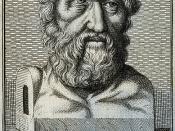Aristotle's thoughts on Zeno's Arrow Argument as represented in Chapter 9 of Aristotle's Physics: A Guided Study can be understood in such a way that it might not be 'next door to madness'. In this chapter, Aristotle interprets Zeno's argument of the Flying Arrow as 'missing the mark'. There are four premises for this argument, and in Aristotle's opinion, premise three can be rejected. He does not believe that time is composed of indivisible nows, which he proves with laws of science. However, by evaluating the falsity of premise three, you will find that premises one and two are also false. Almost all opinions can be argued, however, and by evaluating the philosophy of both men, many points can be reached about the validity and soundness of the argument. Though, by finding the premises false, the argument is not sound, and therefore, Zeno's argument leaves much to be said.
Deciphering from what we know of the argument by what Aristotle tells us in Chapter 9, the premises are sketched out:
1. Everything is at rest when at a place equal to it;
2. The Flying arrow is at rest when at a place equal to it;
3. Time is composed of indivisible nows (instants).
4. Everything that changes place is doing so in the now.
5. Conclusion: The flying arrow doesn't move.
According to Zeno, time is composed of many indivisible nows, or instants. Aristotle disagrees, stating in line 210 that no magnitude, including time, is composed of indivisible nows. Exactly how long is an instant? Is time finite? As you start dividing time, the smaller you get, the less movement occurs. But even when you do divide it smaller and smaller, is there not at least some small amount of movement occurring? When will time get so small that...



Great essay
Could have been little more in depth and better structered conclusion with some own opinions.
0 out of 1 people found this comment useful.